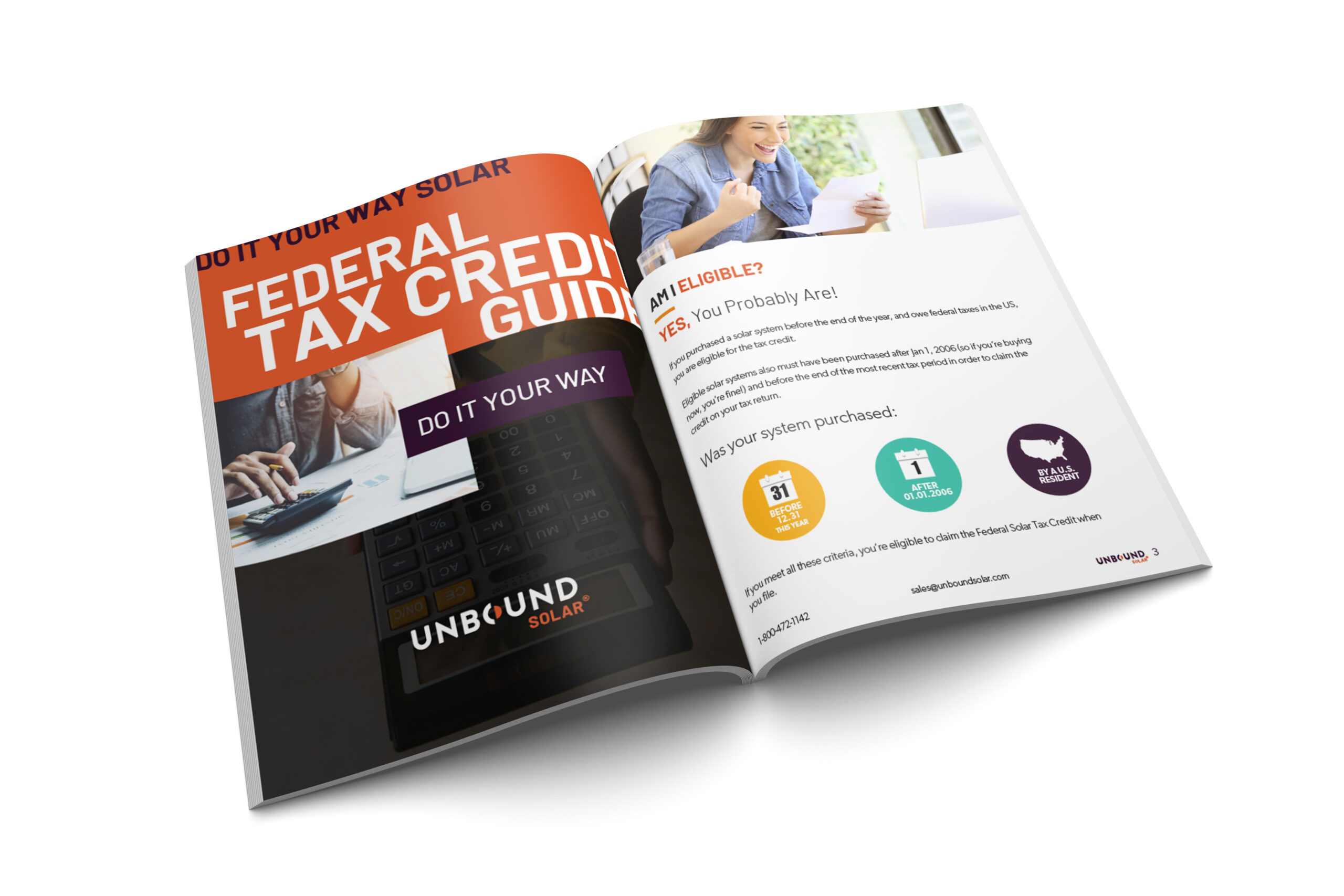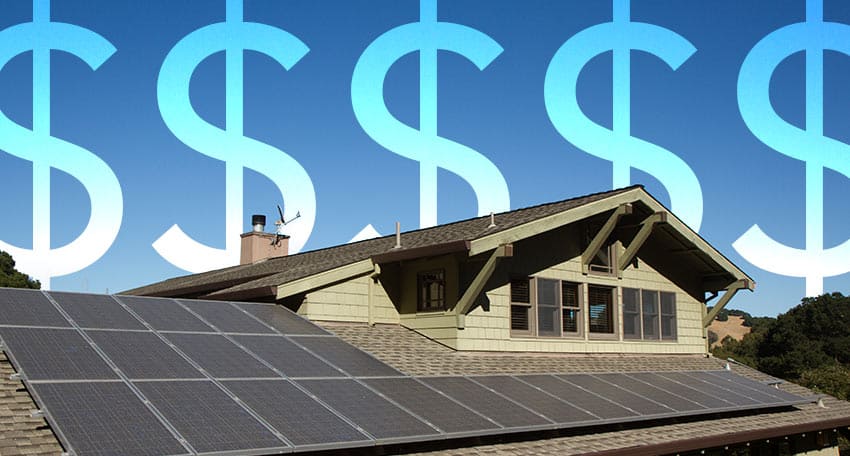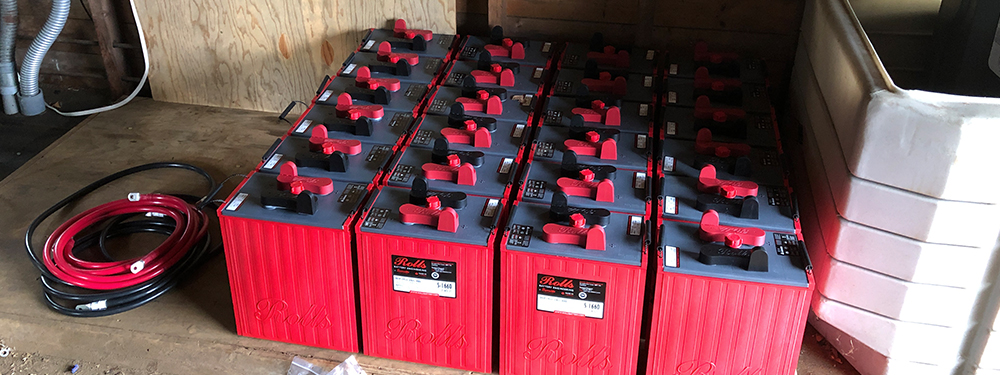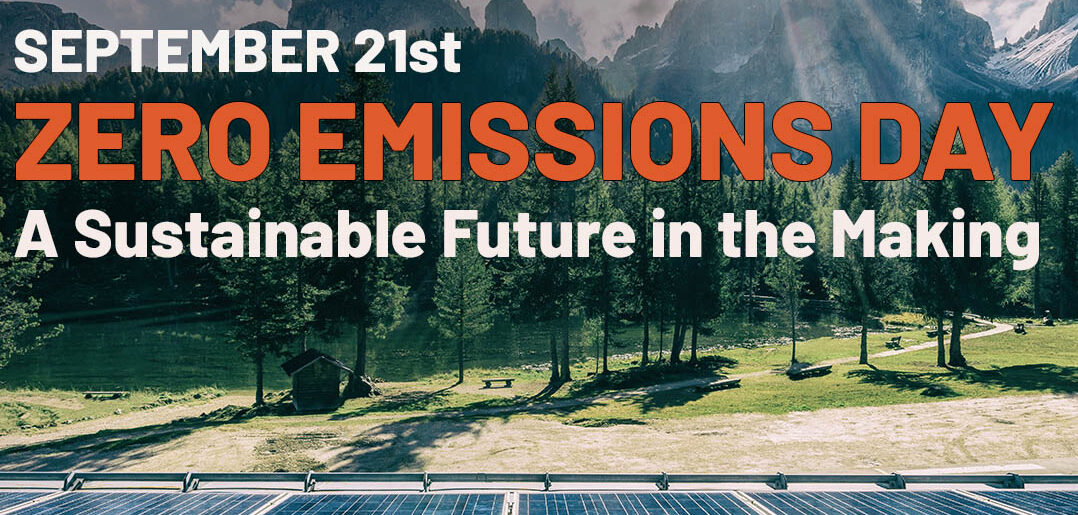Do Solar Panels Increase Property Value?
A recent study by the Lawrence Berkeley National Laboratory concludes that solar panels increase home value by $14,329 on average. Homes equipped with solar power systems sell for 3.74% more than comparable non-solar properties.
One of the strongest arguments for solar energy is that it’s an investment that pays for itself. Any upfront costs are paid back in the reduction (or elimination) of energy bills, and solar customers can reasonably expect to see a return of at least 2-3 times their initial investment over the life of the system.
But those numbers assume you live in the same house for the full duration of the warranty – which often isn’t the case. And one of the reservations holding a lot of people back switching to solar is the fear that they might not live in their house long enough for the significant up-front investment to pay off.
If you own your home, this research should assuage those fears. Outfitting your home with a grid-tied solar energy system drives up property values and offers an enticing selling point for real estate agents to market a listing.
To figure out how much you could save by going solar, check out our guide to calculating the ROI of your solar electric system in our resource center.
Even if you don’t live in your home long enough to break even on energy costs, the premium that home buyers are willing to pay to move into your solar-ready home will be more than enough to cover the investment.
Solar Homes Sell For $14,329 More On Average
The study evaluated the sale price of 22,822 homes across 6 states to determine what effect solar power systems have on home resale value. The study compares the sale price of 3,951 PV Homes (homes equipped with photovoltaic systems – a.k.a., solar-powered homes) to 18,871 Non-PV Homes.
The research finds that, on average, solar panels increase home value by $14,329 – or 3.74% more than their non-PV counterparts.
Since the average system costs $10,000-$18,000 in materials, homeowners can reasonably expect to recoup the cost of the hardware when they choose to sell their home. That’s on top of the expected savings from reduced energy bills and tax incentives, which can already pay for the system 2-3 times over the life of the warranty.
As a bonus incentive, some states don’t count PV systems toward the value of your home when calculating property taxes. Adding a $15,000 kitchen will raise your property taxes, but a $15,000 PV system might be exempt. This comes down to local regulations, though, and certainly isn’t true everywhere in the U.S.
Digging Deeper Into the Data
Of course, real estate is a complex market, with countless factors influencing the valuation of a property. National averages will never tell the whole story. So let’s take a closer look at the data and see if we can uncover some more specific information.
Diminishing Returns on Larger PV Systems
One conclusion the authors of the study draw is the existence of a “green cachet” for homes equipped with PV systems. Solar-equipped homes sell at a significant premium, regardless of the wattage output of the system. The sale price of homes with more powerful PV systems did not increase proportionally to the installation cost of the system.
This suggests that homebuyers are prepared to pay more for the distinction of owning a “solar home,” regardless of the efficiency of the system, or its ability to fully cover their expected energy usage. They will pay marginally more for larger systems, but not in proportion to what the system is actually worth.
For sellers, that means it might make sense to install a modest grid tie system that relies on stored solar energy most of the year, but pulls from the electric grid during heavier usage periods, like when the A/C runs on full blast during the dog days of summer.
This may afford you the flexibility of marketing your listing as a solar home, while keeping installation costs down and turning a profit on the system when the sale goes through.
Of course, taking on an extra project like this adds time, labor costs and risk to the sale process. It may not be worth the investment, especially because…
Solar Homes May Take Longer to Sell
The study also found that, on average, solar-equipped homes take slightly longer to sell than their counterparts. Solar homes spend an extra 8 days on the market before they sell, as demonstrated by the chart below.
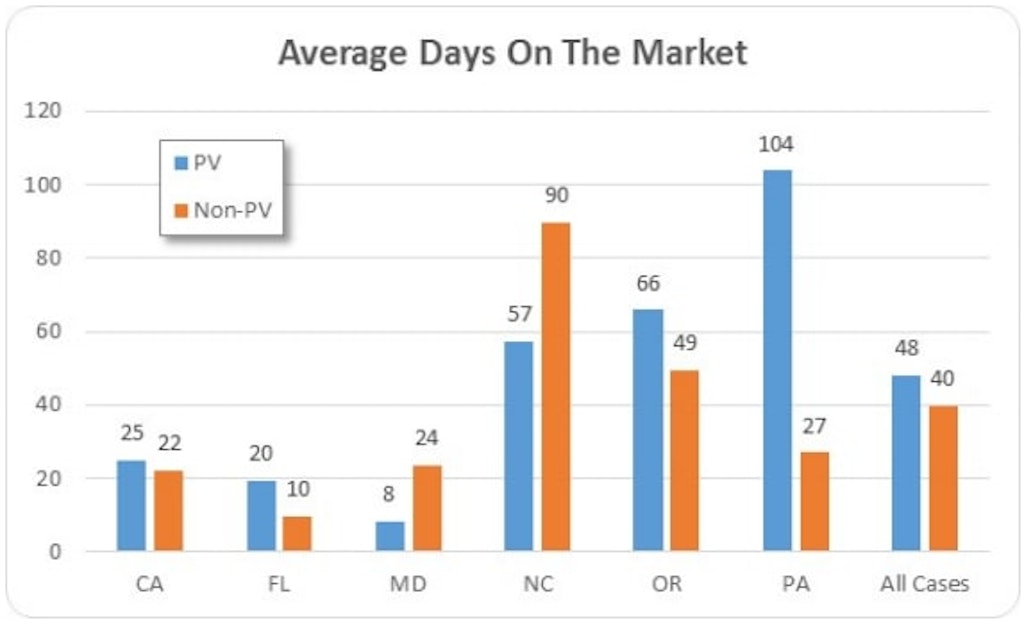
Note that there is quite a bit of fluctuation in the data on a state by state basis. This could be attributed to a couple factors:
Small sample size in some states
The data from CA is much more robust than other states in this study, which may explain why its numbers come closest to the national average.
Incentives vary by state
Some states offer stronger incentives for buying a solar home, while others offer nothing at all. Solar homes may languish on the market for much longer when there is no incentive for owning a solar-enabled home. For example, some states offer a break on property taxes if you own a solar home. It might be more enticing to buy a solar home in those areas.
We strongly recommend exploring our guide to State Solar Incentives if you’re in the market to understand how the dynamics might change based on your location.
Local perception of solar
Solar power has been more broadly adopted in places like CA and FL, where sunshine is plentiful and there are strong tax benefits for going solar. Other states lag behind in adoption and education on the topic.
In areas with lower electricity costs and poor benefits for solar adoption, the awareness of solar as an viable energy source tends to be quite low. Buyers may hesitate to buy a solar-powered home because they aren’t convinced the system is reliable. They also may not understand the long-term benefits, making solar homes a harder sell.Solar education in lower adoption states can be a major stumbling block. In many cases, buyers don’t understand the difference between grid-tie and off-grid systems. They tend to assume all solar energy systems are off-grid, which rely on panels to generate 100% of their energy and run entirely on a battery storage system. The fear is that they’ll be stuck without power if the solar array goes out and they don’t know how to fix it.
In reality, most systems are grid-tied. They generate their own energy, but still hook into the public utility grid. The solar panels don’t need to generate 100% of your home’s electricity — the grid can pick up the slack in periods of heavy usage. And if the power goes out, it’s on public utility workers to fix the issue and get things back up and running as soon as possible.
In areas where solar energy is less popular, a little education may be necessary to convince buyers that a PV system is a reliable way to power their home.
Learn more about the difference between off-grid and grid tied systems with our Getting Started Guide.
Newer Systems Are Worth More
Okay, this one should be common sense – but just to be thorough, it’s worth pointing out that the data backs this up.
Newer PV systems are made from more efficient materials, have more years left on their warranty, and are less likely to be due for replacement parts (like a new inverter, which you can expect to replace about halfway through the life of a system). As PV systems age, their value depreciates, and they tend to be worth less when you put your home on the market.
Pretty simple – newer installations are a greater boon to property values, as you would reasonably expect.
Leased vs. Owned Systems
Finally, the premium only applies to homes with host-owned PV systems. If you agreed to a solar lease or PPA (Power Purchasing Agreement) with the developer who installed the system, you likely won’t see much—if any—of the higher sale price returned to you as profits. In these cases, buyers will request the previous owner pays off their lease or PPA agreement, which offsets the additional value built into the final sale price of the home.
The extra cash from the sale only goes into your pocket if you have purchased your PV system outright. That’s one of the reasons we strongly recommend buying your system instead of leasing it.
Related Article: Should You Buy, Lease or Loan Your Solar System?
A Few Caveats
As with all research studies, it’s important to pay close attention to the methodology used to make sure we’re drawing the proper conclusions. Here are some important pieces of information about how this study was conducted:
The data spans home sales from 2002-2013.
The LBNL study only evaluates homes sold between 2002 and 2013. But more recent advancements in solar technology have made installations quite a bit cheaper since then, which may have an impact on their appraisal value in more recent home sales.
The most recent report on the cost of PV systems from the NREL (National Renewable Energy Laboratory) shows that in 2017, the cost to install a residential PV system in the U.S. is less than half of what it was in 2010. In fact, solar prices seem to have leveled off right around 2013 – the last year data was collected for the LBNL study.
As PV systems become more efficient to install, that may translate to a smaller impact on home resale values in the future. But since the premium on sale prices will likely shrink at the same rate as the installation costs, we still expect sellers to recoup the hardware cost of their system when they go to sell their home.
The research was conducted in 6 states: California, Oregon, Florida, Maryland, North Carolina, and Pennsylvania.
According to this ranking of the solar-friendliness of all 50 states, 3 of these 6 states ranked among the top 12 in the nation, and the worst was still close to average – Florida, at #28. With that in mind, the data skews heavily toward states with higher-than-average solar adoption. The impact of solar panels on home resale value will certainly be a bit lower for states lower down the list. You may see a smaller impact on property values if you live in a less solar-friendly state.
It’s hard to say for sure – the research is still limited, and we don’t yet have reliable country-wide data to draw from.
The study examines homes much more expensive than the national average.
The mean sale price of homes examined for this study was $431,964, which more than doubles the median home value in the US. The highest-selling home it appraised went for $899,000.
It’s hard to say whether solar readiness remains a strong purchase motivator once you get into the territory of high-end homes. We can’t think of a reason these trends wouldn’t hold true for million-dollar homes, but the LBNL doesn’t cover that market segment in their study, so it’s worthwhile to consider the dynamics may change for high-value properties.
For more modest homes, the data is much clearer. Smaller properties need smaller systems to cover their electricity usage. As you spend more on a PV system, the premium on home resale value doesn’t scale to match the investment. Smaller systems for more modest homes ($150K-$300k) actually return a much higher margin on the investment when the home hits the real estate market.
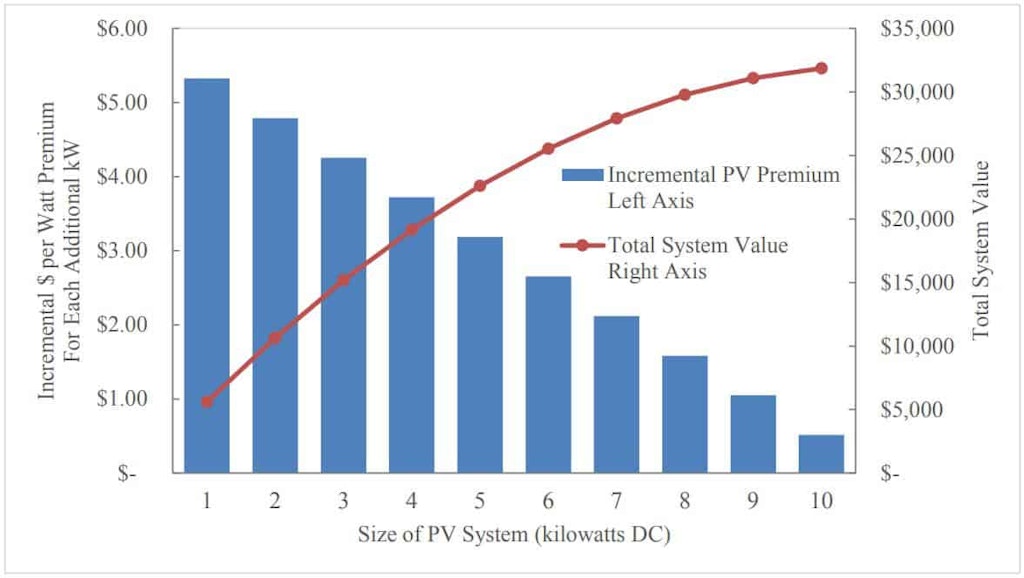
Final Thoughts
Any way you slice it, solar is a sound investment.
If you live in your home for the duration of the warranty, you can expect a grid tie system to pay for itself 2-3 times or more in tax breaks and energy savings.
Even if you decide to move before the warranty is up, you still come out ahead. The value of the system translates directly into a higher sale price when your home hits the market. And that premium is typically enough to cover the cost of the hardware, which means homeowners break even on their solar investment right from the start.
